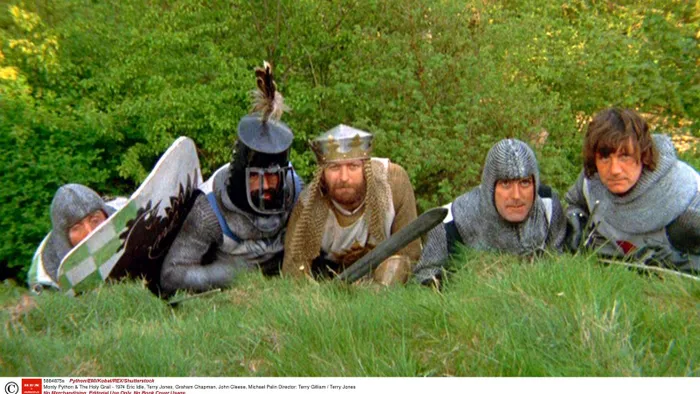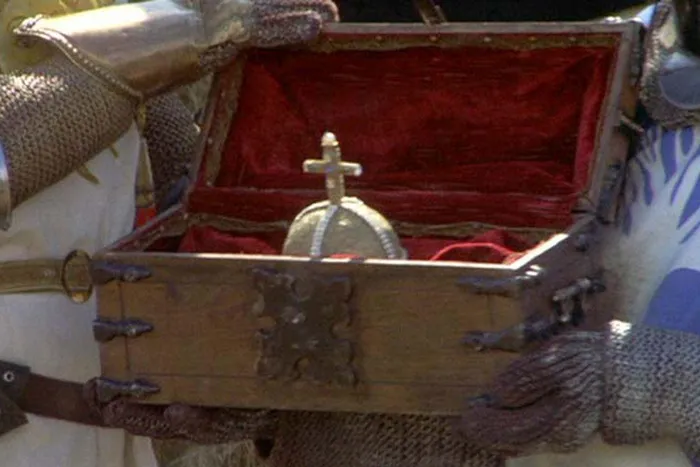‘Monty Python and the Holy Grail’ turns 50 but still hasn’t grown up
silly capers

The Monty Python team in Monty Python & The holy Grail.
Image: Supplied
Travis M. Andrews
This essay killed me.
Terry Jones, from somewhere in the back: “You don’t look dead to me.”
I got better.
But, honestly, what is left for a writer to say about “Monty Python and the Holy Grail,” the seminal comedy that seemingly dropped from the heavens like one of the movie’s cartoon God hands? Aside, of course, from “Ni!”
Far smarter, funnier and more insightful people than I have spent the past five decades poring over its every frame, so perhaps it’s best to focus on how it made an entire generation of comedy nerds - emphasis on “nerd” - pretty much undatable.
“You had to memorize ‘Holy Grail,’” Jimmy Fallon once said. “If you play ‘Dark Side of the Moon’ while you watch ‘Holy Grail,’ I guarantee you’re not getting laid.”
“Monty Python and the Holy Grail,” written, directed, acted in and produced by the comedy troupe of Graham Chapman, John Cleese, Terry Gilliam, Eric Idle, Michael Palin and Jones, hopped into theaters like the Rabbit of Caerbannog 50 years ago and forever altered the trajectory of modern comedy.

The French taunts were probably the strongest language in the movie - as innocuous as "Your mother was a hamster and your father smelt of elderberries"
Image: Supplied
A legion of lovable losers (hi) were turned on to the movie (alongside 1978’s “Animal House” and 1974’s “Blazing Saddles”) by their equally nerdy parents the way we’ll probably show our kids the quotable comedies of our prime years in the 2000s, such as “Anchorman” or “Wet Hot American Summer.” We quoted “Holy Grail” ad nauseam. “’Tis but a flesh wound” become our rallying cry. When we prepared meals, we would joke we were having “lambs, and sloths, and carp, and anchovies, and orangutans, and breakfast cereals, and fruit bats, and large chulapas.” How many first dates ended when one of us accurately - thus, earsplittingly - quoted one of the Knights Who Say “Ni!”? (If the answer is even one, which it undoubtedly is, the Pythons should be flogged.)
And I cannot be the only one who, when preparing to get married, was told by my future spouse in no uncertain terms that our wedding invite could not include the question, “What is the airspeed velocity of an unladen swallow?”
Also, God bless if your name happened to be Tim.
Some of us (hi) performed improv that we’re glad was never filmed. Sadly, more of us (sigh, HI) thought improv would lead somewhere.
For many, it sparked an obsession that didlead somewhere.
For one, the film’s secret language spoke to Judd Apatow, arguably the last defining voice in cinematic comedy. “When I was a kid, I was obsessed with comedy but had no one - literally, no one - to talk to,” Apatow told the Guardian in 2009. “So all my friends would be playing sports after school, and I’d go home alone and watch Monty Python.”
He memorialized his experience in his cult classic high school TV show “Freaks and Geeks,” set in 1980. In the pilot, the geeks skip the homecoming dance (to their parents’ chagrin) for a screening of the 1975 movie. Later, after being traumatized by the jocks, they find solace in the movie.
For a generation of geeks, it wasn’t only a revelation, it was a warm blanket.
- - -

One of the silliest weapons of mass destruction was the Holy Hand Grenade of Antioch.
Image: Supplied
One of the first movies I remember watching is “Monty Python and the Holy Grail,” and I sincerely believe it informed my sense of humor if not my entire worldview. The guiding light of Monty Python was, of course, silliness. They believed that back in 1975, the world needed a touch more of it. In 2025, we need a chalice full.
As in their time, modern politics lack a sense of play while emulating it. But as the Pythons probably would have guessed, that sense of play grew within the jesters of modern culture - sometimes mainstream, sometimes underground. “The Simpsons” creator Matt Groening was inspired by the “high-velocity sense of the absurd and not stopping to explain yourself.” The creators of “South Park” were inspired by the crude animations found throughout the Python catalogue.
That kind of boundless play - the kind you find when you’re a kid bumming around the neighborhood with your friends, creating grand adventures out of nothing but imagination and maybe a few props either purchased (like dolls) or discovered (like weirdly shaped rocks), the kind inherent in riffing with buddies in an accidentally and organically secret language - has now migrated to social media, seen in the style of non-sequitur short clips that sprang up from Vine and migrated to TikTok.
Here’s an alpaca playing soccer. Here’s a dog with a cicada buzzing around in his mouth. Here’s a kid who really likes turtles. (Yes, my algorithm tends to feed me animal videos.)
This is where it lives now: that sense of whimsy, of discovery, of wonder.
The Pythons taught us that all the rules are simply human-made. Anything can happen.
That’s what I remember most about seeing “Monty Python and the Holy Grail” for the first time. I spent most of it thinking, “You can do that?!”
- - -
The movie begins before it begins, explaining to the viewer that anything is on the table by subtitling the credits with fake (and obviously incorrect) Swedish subtitles that slowly transform into English ones about a moose biting someone’s sister. Sometime after a credit “signed” by Richard M. Nixon, these very British words flash across the screen: “We apologise for the fault in the subtitles. Those responsible have been sacked.” And then another, announcing the people who did the sacking have been sacked.
The gag doesn’t stop there. The jokes shift from moose to llamas, and the whole ridiculous sequence lights the beacon for what’s to come: Not a second of screen time will be wasted without some attempt to be funny.
That promise is fulfilled seconds later, when the film begins with an extended argument between King Arthur and castle guard about whether a migratory European swallow could carry a coconut on its journey. Then we’re immediately in a town, where a medieval garbageman is rolling around a cart topped with dead (or, in one instance, almost dead) bodies and yelling, “Bring out your dead.”
The economy of the movie is striking. Sans the closing credits, the entire genre-defining comedy runs under 90 minutes - nearly all of them memorable and easily referenced by shorthand some 50 years later.
One of the movie’s tricks is how simple it all seems while it also pushes the boundaries of form and imagination rather than social norms. It doesn’t try to shock as much as surprise, scandalize as much as delight. The harshest things said in the whole movie are probably the French taunter’s infamous insults to Arthur and his crew: “I fart in your general direction! Your mother was a hamster, and your father smelt of elderberries! … Now go away or I shall taunt you a second time!”
Yes, many of the jokes seem almost designed for pre- or newly pubescent boys (and, in fairness, probably were): squirting blood, goofy made-up words, a castle of horny young maidens. But as I’ve gotten older, aspects of the movie revealed themselves like said maiden to Arthur and his knights.
Sure, I still love watching the Black Knight get his limbs lopped off while confidently insisting on continuing the sword fight. But what sends me reeling now is when King Arthur stumbles upon an anarcho-syndicalist commune whose members reject his kingship because they never elected him.
As stirring music swells, Arthur explains to the unimpressed workers how the Lady of the Lake gave him Excalibur, thus cementing his status as king of the Britons.
“Strange women lying in ponds distributing swords is no basis for a system of government,” one responds. “Supreme executive power derives from a mandate from the masses, not from some farcical aquatic ceremony. You can’t expect to wield supreme power just ’cause some watery tart threw a sword at you.”
In 2025, the exchange almost feels like one you would find on X or Bluesky. When our American body politic is as absurd as the limbless Black Knight, the sequence is strangely comforting (or terrifying, depending on the day). Are farcical aquatic ceremonies really that bad?
Arthur, of course, doesn’t take kindly to this, grabbing the peasant, who shouts: “See the violence inherent in the system! Help, I’m being repressed!”
The absurdity and, ultimately, banality of power structures - the political and religious - are baked throughout the film. The ruling class - in this case Arthur, his knights and their coconuts - are nothing more than fools, ultimately in control of essentially nothing.
Of course, Monty Python would never put forth something so boring, so droll. They sneak in political commentary the same way the Trojan Rabbit in the movie tries, and miserably fails, to sneak Arthur and his band into the French castle. A four-sentence exchange between peasants, as Arthur “gallops” past, gets the point across.
“Who’s that, then?”
“I don’t know. Must be a king.”
“Why?”
“He hasn’t got s--- all over him.”
Ultimately, for any writer foolish enough to attempt it, a search to find deeper meaning in the movie is as absurd as Arthur’s search for the grail itself and would rightfully be mocked by the Pythons just as heartily.
Better to go watch “Monty Python and the Holy Grail” for the 100th time. And, after that, go find a nice shrubbery.
Maybe laurel.